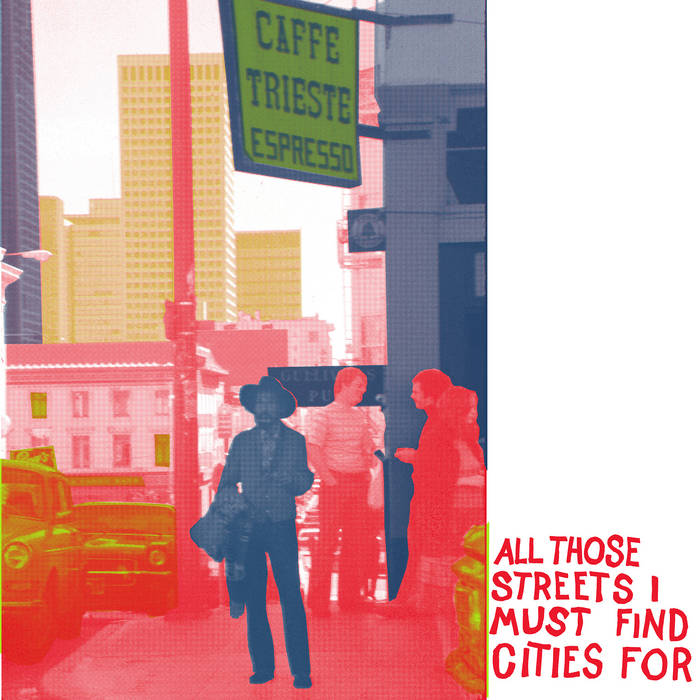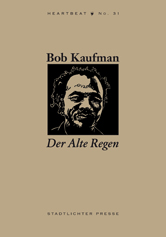Die Plastic Beatniks sind LeRoy und Micha&Markus Acher, und sie haben mit ihrem großartigen neuen Album auf Alien Transistor (die Tracks aus dem Hörspiel „Thank God for Beatniks“ von Andreas Ammer, vgl. BR-Audiothek) BR-Musikjournalistin Judith Schnaubelt zu einer (weiteren) sehr schönen Sendung im Nachtprogramm angestoßen:
„The Plastik Beatniks reanimieren nun auf ihrem Album „All Those Streets I Must Find Cities“ die Kunst des afro-amerikanischen Beatniks Bob Kaufman mit jetztzeitigen Beats und Sounds aus Hip-Hop und Jazz. Gute Lyrics können auch die Tindersticks oder Calexico, und sie sind ebenfalls musikalisch vom Jazz inspiriert, auch wenn es aufs erste Hören gar nicht so scheint. Judith Schnaubelt fertigt aus all dem eine klingende Collage für diesen Podcast“ und hat den ganzen Stoff im Blick: „Während Beatnik Jack Kerouac selbst in jungen Jahren den Jazz feierte, werden seine Gedichte und sein Roman „On The Road“ von jeder Generation neu entdeckt und geschätzt. Nicht mehr so präsent ist heute, dass viele Jazzkünstler damals auch Dichter waren. Zum Beispiel Billie Holiday, Charles Mingus, Stanley Crouch: „And everything was sound and the words grew strong“, rappten die Last Poets im Jahr 1972 und bescheinigten dem Ganzen eine „sophisticated funkiness“. Arthur Lee von der kalifornischen Band L.O.V.E. reicherte seine Reime mit psychedelischem Rock an; Gil Scott-Heron verwebte politisch-poetische Lyrics mit Soul und Funk.“
https://www.br.de/radio/bayern2/sendungen/podcasts/poeten-auf-dem-pop-planeten-100.html
![]()

https://theplastikbeatniks.bandcamp.com/
„The 12 wildly different songs and audi collages, on the transatlantically-produced album, „All the Streets I Must Find Cities For,“ is based on lyrics by Beat author Bob Kaufman. They were originally part of the radio play „Thank God for Beatniks,“ for which author Andreas Ammer („Ammer & Einheit“), brothers Markus and Micha Acher („The Notwist“, „Hochzeitskapelle“) and loop maker Leo Hopfinger („LeRoy“, „Das Hobos“) formed „The Plastik Beatniks.“ On the eastern side of the Atlantic they composed music and crafted soundscapes. On the west side of the ocean, they asked three of the most renowned singers, activists and producers in the U.S. to recite or sing Bob Kaufman’s poetry.
Punk-pop icon Patti Smith immediately signed on to read Kaufman’s poem „Ginsberg (For Allen)“. Free jazz vocalist Moor Mother passionately performed Bob Kaufman’s „War Memoir“. American jazz clarinetist, composer, singer and “International Anthem” labelmate Angel Bat Dawid, a legitimate successor to Sun Ra, polyphonically read and sang such poems as „The Sun is a Negroe“ and „West Coast Sound 1956“ and included some clarinet solos on top. Also on the album, Bob Kaufman himself recites his previously unknown poems „Hollywood Beat“, „Would You Wear My Eyes“, and the „Jail Poem“ „All Those Streets I Must Find Cities For“. Beat chronicler Raymond Foye, who still lives at the Chelsea Hotel in New York, contributed an interview he conducted with late beatnik Allen Ginsberg about Bob Kaufman. Completing the circle was hip-hop artist Adam „DoseOne“ („13+ god“), who once gave Markus Acher a well-thumbed volume of Bob Kaufman, whom he admired. He contributed some raps. Thus 12 tracks emerged, as diverse as the artists, poets and musicians who contributed to it. More than an album. An epitaph. A work for the eternity of Beat.
Regarding Bob Kaufman – of course the FBI kept a file on him – first as a sailor, then a communist, and finally a Beat poet. As one of the mainstays of the movement, he edited the literary magazine „Beatitude“ in San Francisco and defined „Beatnik“ to Allen Ginsberg: half rhythm, half sputnik. Bob recited his poetry loudly on the streets (when he wasn’t sunk into years of silence in protest of the Vietnam War) and in the bars and bagel shops of North Beach. Once, he almost landed a pop hit („Green Green Rocky Road“), which then made Dylan’s companion Dave van Ronk famous. That Kaufman is today less known than his friend Allen Ginsberg may be because he was a black Beat poet, and also a Jew. This was not compatible with fame in the US of the 1950s. Though Kaufman had the same publisher, City Lights, as Ginsberg, he was frequently arrested and jailed, and was treated with electric shocks until he developed serious mental heath issues. There he wrote his „Jail Poems“. The seventh of these lent this album its name:
„Someone whom I am is no one / Something I have done is nothing
Someplace I have been is nowhere / I am not me
What of the answers / I must find questions for?
All these strange streets I must find cities for,
Thank god for beatniks.“
Umfangreiche neue Bob-Kaufman-Sammlung, übersetzt von Egon Günther:
 „In den Anfangstagen der San Francisco Renaissance wurde Bob Kaufman so etwas wie eine Legende. Seine Dichtung entstand während der Dichterlesungen durchweg aus dem Stegreif, oft von Jazz inspiriert. Mit seiner Improvisationstechnik, dem surrealistischen automatischen Schreiben verwandt, schuf er ein Werk, das von visionärer Lyrik, durchsetzt von satirischen, meist dadaistischen Elementen, bis hin zu prophetischer Dichtung, gespeist aus politischem und sozialem Protest, reichte.“
„In den Anfangstagen der San Francisco Renaissance wurde Bob Kaufman so etwas wie eine Legende. Seine Dichtung entstand während der Dichterlesungen durchweg aus dem Stegreif, oft von Jazz inspiriert. Mit seiner Improvisationstechnik, dem surrealistischen automatischen Schreiben verwandt, schuf er ein Werk, das von visionärer Lyrik, durchsetzt von satirischen, meist dadaistischen Elementen, bis hin zu prophetischer Dichtung, gespeist aus politischem und sozialem Protest, reichte.“
http://www.stadtlichterpresse.de/buch/978-3-947883-08-0.html